Jim Heath is the singer, songwriter, and guitarist for Reverend Horton Heat, a band which updated the sound and energy of rockabilly for the alt-rock era and beyond.
Reverend Horton Heat hit the ground running with their first album, 1992’s Smoke ‘Em If You Got ‘Em, which has gems like “Bad Reputation”, “Marijuana”, and “Psychobilly Freakout”. They’re still going strong ten albums and countless live shows into their career, with Heath’s twisted humor taking a front seat on songs such as “Please Don’t Take the Baby to the Liquor Store” and “Death Metal Guys” from their latest album, 2009’s Laughin’ and Crying’.
This interview was done by phone on 12/19/12 for a preview article on the 12/30/12 Reverend Horton Heat concert in Ventura, with special guest Jello Biafra joining in for a few songs.
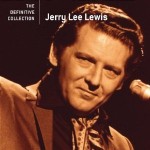
Jeff Moehlis: I saw you open for Jerry Lee Lewis about two years ago for his 75th birthday concert. What was that gig like for you?
Jim Heath: Oh, man, that was a great gig. That was just all around a beautiful day. I got to meet Jerry Lee briefly. That was great. And getting to hang around Lemmy [Kilmister, whose band The Head Cat also opened that night] and Slim Jim [Phantom] all evening, and having them freak out over Jerry Lee Lewis, too. It was kind of neat.
It’s a little bittersweet to think about right now, because Jerry Lee’s bass player, his name is B.B. Cunningham, and he came and tracked me down and said “Where’s the Reverend? I’ve got to talk to the Reverend.” And I was just thrilled that I got to talk to B.B. He had a hit back in the 60’s called “Let It All Hang Out”. That was a song that he wrote. But anyway B.B. Cunningham got shot and killed a couple months ago.
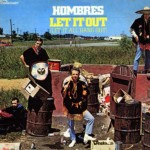
That was a really cool deal, because Jerry Lee Lewis is one of my big musical influences and heroes.
JM: What can we look forward to for your upcoming show in Ventura?
JH: That’s one of the shows with Jello Biafra. That should be something very… [laughs] We don’t really know what that’s gonna be. We have been working on the songs for it.
What’s going to happen is, right towards the end of our set, we’re gonna stop, and Jello Biafra, the lead singer from the Dead Kennedys, will come out and sing five songs. Mayhem should ensue.
JM: Will those be Dead Kennedys songs, or Reverend Horton Heat songs, or some combination? Or is that all secret?
[Jim wanted to keep the songs a surprise, so for now let’s just say that there will be a couple of Dead Kennedys songs and some covers.]
JM: I can keep it secret if you want.
JH: OK, that’d be good. I will say this. His new song that we’re doing is a real cool all out rock ‘n’ roll song, a lot like a Dead Kennedys song.
JM: Were you a fan of the Dead Kennedys back when they were originally together?
JH: Oh yeah, oh yeah.
JM: Did you ever see them perform live?
JH: No, I never did. I never did.
JM: How do you prefer to categorize the music of Reverend Horton Heat? Do you prefer psychobilly, or some other description?
JH: Well, not really. Because I never really considered us to ever be a psychobilly band. We started out basically being a rockabilly band, but we’ve kind of got our own thing going. You know, I don’t mind.
And rockabilly’s kind of a hard thing to explain to average people. People who know music pretty much know what it’s about, or now they do. They absolutely did not when we first started touring America, by the way. So now, if one of my childrens’ friend’s father asks what kind of music do we play, if I say “rockabilly” that opens up a whole other explanation. So what I usually just tell them, is I say that we play rock ‘n’ roll. But it’s heavily influenced by 50’s rockabilly.
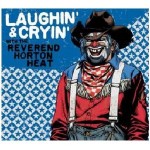
JM: One thing I like about your music is that a lot of your songs crack me up, “Death Metal Guys” and stuff like that. Could you comment on the role of humor in your songs?
JH: Well, I don’t think I’m going to do that on our next record. I’ll always have funny songs, but I don’t think I’m going to try to do it as exclusively as I did lately. You know, it’s entertainment. People like it when they can laugh and relate to a song. I’ve got a lot of songs that are serious, that I think are pretty good songs. But overall people usually really like the funny stuff.
JM: I think it’s all good. But it’s nice that you’re not taking yourself too seriously.
JH: Right, and that’s kind of part of my style. My lyrical style is that I’ll start out with a song, and by the end you’ll realize that this guy cannot be serious. At the beginning you might think that I’m actually serious about it, and by the end… It’s like, I have the song “Eat Steak” where it starts out like it could be the theme song from the American Beef Council, but as the song progresses it gets a little bit stranger, and by the end of the song it’s all about how much fun it actually is to kill a cow. Which is pretty morbid. Probably by the end of the song you might even be encouraging vegetarianism [laughs].
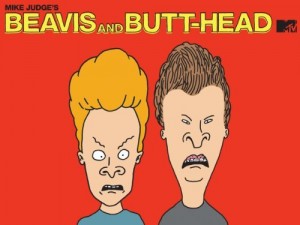
JM: Still on the topic of humor, was it a big milestone for you to make it onto Beavis and Butt-head?
JH: That was pretty neat. Yeah, that was pretty cool. But, you know, that was a whole inside job there, you have to realize. We’re all Dallas guys – Mike Judge is from Dallas.
Before Beavis and Butt-head… [laughs]. I just had this weird habit, probably because I was up so late. The early days of Reverend Horton Heat, we’d play a lot of gigs around Dallas, and I’d have to usually set up a PA system and everything to make those gigs happen. We’d play all the way up to 2:00 in the morning, then I’d tear down until 3:00. So there was really nothing open, so I’d go to the 7-11. They’d actually let you smoke cigarettes in there, and they had a pinball tables [laughs]. I’d go there and hang out with these Vietnamese guys at the 7-11 and play pinball. He drew a cartoon of me wearing one of my rhinestone suit smoking a cigarette playing pinball [laughs]. They put that in the local newspaper one time – it was quite embarrassing.
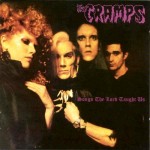
JM: You mentioned Jerry Lee Lewis as an influence. I know that a more modern influence on you was The Cramps. Any thoughts on the late Lux Interior?
JH: He was a super cool guy. One of the most engaging, alive frontmen I’ve ever seen and will ever be. When we toured with them, it got to be one of things like, OK here they go. What’s he gonna do tonight? Because he was always doing this crazy stuff. It was almost like life-threatening for him every night, the stuff that he would do and pull off. It was really out there.
But besides that, the guy had great tasted in music, and liked a lot of the same mid-century American 50’s rockabilly/surf. But then the kooky side, the really kooky, funny side of that era of music, like I do. Oh God, the funny stuff that he did every night.
You know, a lot of the bands that we tour with are great, and we love seeing them. But that band, man, we watched them every night. Because you knew if you didn’t you were going to miss something really funny and cool.
JM: You’ve been performing as Reverend Horton Heat for over 25 years. How do you keep it fun?
JH: I just try to have the right attitude, I guess, about it. Sometimes it’s hard to be out here, away for this much of my life. It’s pretty weird. But I just try to think about, you know, this is a dream career. I just try to keep a good attitude.
The touring part’s hard. But getting up in front of the people and playing music, that’s just the greatest thing ever. That’s easy. That’s the dream job there.
JM: What advice would you give to an aspiring musician?
JH: Figure out some way to get a really good running van. That’s it.
JM: You must speak from experience on that.
JH: Yeah, that’s it. You know, there’s two ways to do it. If you really make great music, and you can make demos and release your own local music, if your music is really great there’s still probably a 90% chance that you will never make it in the music business. Now, if your music is pretty good, and you can go and play gigs and make a little bit of money in your home area, in your region, get a really good running van and start playing all over America. As far as you can play. Take the money that you make, whatever gig you make the most money off of, take a good chunk of that portion of money and save it so that you can go and play Tucson, Arizona, where you’re gonna not make more that $100. Save it so that you can go play San Francisco. Save it so that you try to make it up to Seattle, and drive all the way to Seattle only to get paid $100. You’re gonna lose money. So you have to save the money from your local gig. Anyway, you get the picture. If you do that, you will make it in the music business, I guarantee.
Problem is, nobody wants to do that. They want, well, let’s just be a great band and we’ll get signed. To me, you’re a pussy if that’s the way you’d want to do it. Because eventually you’re gonna have to get in that van, even if you get signed. Why not make it on your own terms?
We used Chevrolet, Ford’s good, too. Dodge might be the best. I don’t know. It’s just as long as it runs good. I have heard that Dodge vans are pretty good. But I did see a band recently, they had a Freightliner combo. They call it the Sprinter. That looks pretty good, too. Freightliner, you know, they make the big over the road trucks. So that might be really dependable. But it might be hard to find a place to work on it, I don’t know.
JM: What are your plans, musical or otherwise, for the near future?
JH: I’m really under the gun now, because we just got a great new deal going with this label Victory Records. So now I’m completely under the gun to kick out an album as soon as possible [laughs]. If you think about us having to do a new album and have it be released in 2013, and if you go online and look at our schedule of upcoming dates, I don’t see how we’re gonna do it. But I’m working really hard. We’re able to afford a bus, you know, we take a tour bus, and so right now I’m doing a lot of sitting in the back lounge working on music.
Our last album, I really focused on country. And it’s not basically a straight country album by any means, but it heavily leans country. We’ll always have our funny country song on our albums, or just a country song on our albums, or maybe two. But on this new album I really want to focus on just all out rock ‘n’ roll. The harder edge stuff that is more like our first five or six albums. We had some of that stuff on album seven. We’re not necessarily going back to how we worked in the beginning, but harder edge stuff.
JM: Do you want to set the straight on anything about Reverend Horton Heat? Are there any misconceptions floating around that always annoy you?
JH: Well, yeah. You know, I was a pretty wild guy, and at the same time, back in those days, I could be a bit of an asshole, too. I just went through my phases, probably, where I would drink too much and just turn into a jerk. That kind of happens to people that drink too much. I regret those days.
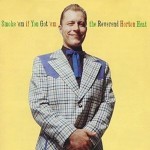
But man, I gotta tell you, the funny thing is at Sub Pop – our first label was Sub Pop Records – their whole deal was releasing press releases or bios on bands that were completely made up [laughs]. So from the very get go of my career I’ve been having to battle misconceptions.
What happened is this girl from Sub Pop called me up to interview me. And it wasn’t like an interview like I do with a person like you where it’s funny, and you ask some cool questions. It was like really mundane. She was gonna write a bio, and so she was like, “So, what do you like to do?” I go, “Well, I like to play pool.” “Oh, OK. Do you smoke cigarettes?” “Uh, yeah.” “What kind of cigarettes do you smoke?” “Uh, Marlboro Lights.” “OK. And where were you born?” [laughs] The most boring interview ever. Through it all she was asking like, “where were you born?” I was adopted. I told stuff. I told her I was adopted, I play pool. I smoke Marlboro Lights. Anyway, so Sub Pop releases this bio saying that I was an orphan, and spent my formative years in and out of juvenile detention facilities, hustling pool and smoking Lucky Strikes [laughs]. So I’ve been battling those types of misconceptions for a long time. You know, guys come up going, “Yeah, dude, I spent a lot of time in juvie, too.” [laughs]
That being said, there’s a little bit of truth to all that stuff, I guess. But not enough to warrant. But it could’ve been worse. Sub Pop had a band called The Dwarves.
JM: Oh yeah.
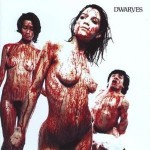
JH: One of the guys quit the band. I think he’s back in the band now. But, anyway, his stage name was He Who Cannot Be Named. Anyway, He Who quit the band, and so Sub Pop issued a press release saying he had died. Rolling Stone magazine ran a big article about how much He Who Cannot Be Named will be missed, and he died suddenly [laughs]. And now he’s back in the band. [Sub Pop claims that the band misled them.]
Admittedly, bios are pretty hard to write. Because, let’s face it, to write a bunch of really great music and to learn to play guitar, you’ve gotta be a little bit of a nerd. You know, what are you gonna write? “Mark Blah-Blah-Blah is a singer/songwriter who lives with his parents. He only tried alcohol once or twice. He really likes macaroni and cheese and his bread without the crust.” [laughs] Not very rock ‘n’ roll.
JM: My last question, and I think this is an easy one. Where are you speaking to me from?
JH: Oh yeah, that’s not always that easy. I do know where I’m at today. I’m in Knoxville, Tennessee.
JM: So you’re on tour right now? Do you have a show tonight?
JH: We have a show tomorrow night in Nashville, and then we’re done until after Christmas when we go out to California to do those dates with Jello Biafra. And we’ll do our New Year’s show. We’re looking forward to it. It’s gonna be a lot of fun. It’s a lot of added to work up these other songs in the middle of me trying to write a new thing. But I don’t have to sing them. Just play the guitar part and let Jello do his thing. It oughta be fun.

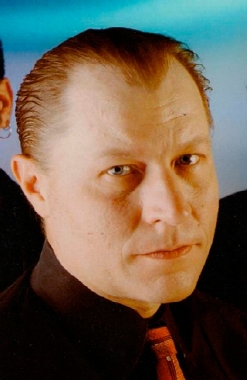
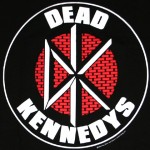
Discussion
No comments for “Interview: Jim Heath”